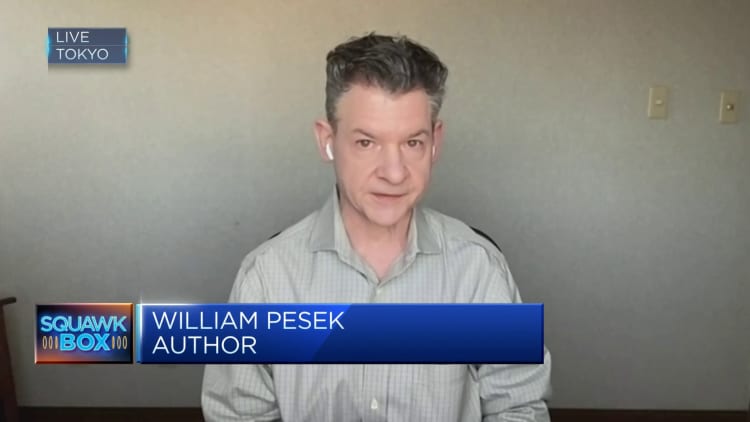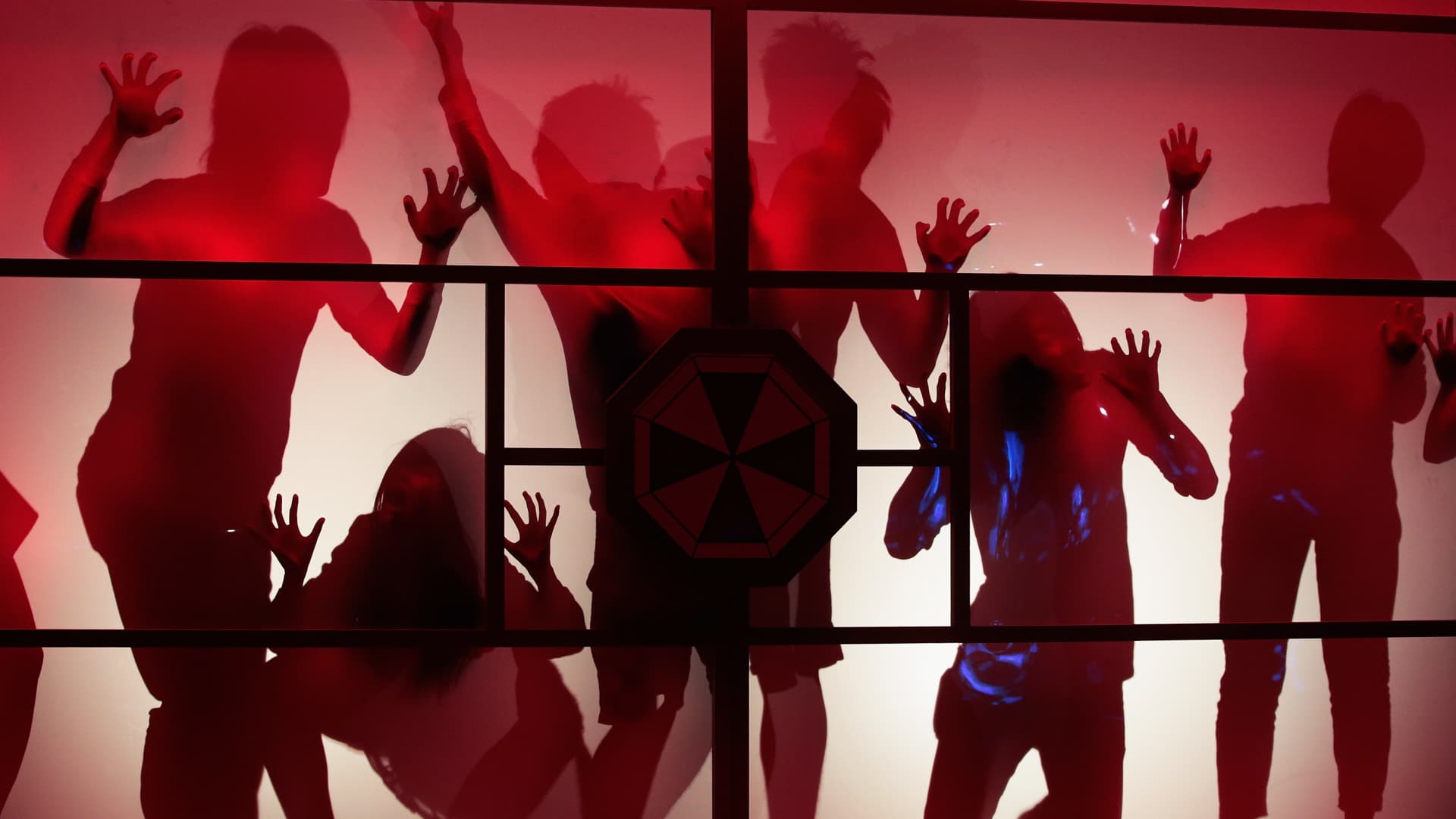TOKYO, JAPAN – SEPTEMBER 03: Zombies perform on the red carpet for the ‘Resident Evil: Retribution’ World Premiere at Roppongi Hills on September 3, 2012 in Tokyo, Japan.
Adam Pretty | Getty Images Entertainment | Getty Images
Japan’s stock markets have been on a stellar run since the start of 2023, repeatedly breaching 33-year highs and outperforming the rest of Asia — but there are rising concerns that “zombie” firms could cut short that rally.
What are zombie companies?
They are businesses that are unprofitable and struggling to keep afloat. They may be able to pay for operating costs like wages, rentals, or make interest payments on debt, but they don’t have excess capital to invest and grow the business, or to pay down the principle.
Japan’s “zombie” problem has been around for a long time, said William Pesek, author of the book “Japanization: What the World Can Learn from Japan’s Lost Decades.”
It is now coming to the fore as the Bank of Japan is widely expected to raise interest rates this year — for the first time since 2007.
Raising the borrowing cost will put these zombie companies at risk of bankruptcy and bailouts, which could have a broader impact on the economy if there are job losses.
Tide goes out
In Japan’s context, the term was first used after the asset bubble and subsequent crash of the 1990s, where banks continued to support companies that would have otherwise gone bankrupt.
As of end 2023, Japan had about 250,000 companies that are technically zombie businesses, according to Pesek.
“Over the last 11 years, we’ve seen the number of zombies increase by about 30%,” Pesek told CNBC’s Martin Soong on “Squawk Box Asia” in an interview on Jan. 29.
The Covid-19 pandemic accelerated the problem of “zombification,” with the number of zombie firms in Japan jumping by nearly a third between 2021 and 2022, Pesek said in a column for the Asia Times on Jan. 25.
His view is supported by market research company Teikoku Databank, which said in a November report that zombie companies have been on the rise since the coronavirus outbreak, according to a Google translation.
The report said the number of the “zombie companies” has increased to 30 times the number of corporate bankruptcies recorded in Japan in 2023, mainly due to “zero-zero” loans that are virtually interest free and unsecured.
As of end-September 2022, approximately 2.45 million loans were disbursed, amounting to approximately 43 trillion yen to support small- and medium-sized enterprises, Teikoku’s research showed.
The Japan Times reported in May that the country’s program of providing “virtually interest- and collateral-free loans” to small businesses during the pandemic helped keep them afloat, and supported the local economy.
“But the aid program has led to an increase in the number of ‘zombie’ companies that would otherwise have been unable to continue operating,” the report added.
However, Pesek has said many companies were “barely breathing” even before the pandemic hit.
In his Asia Times column, he cited Warren Buffett’s famous observation that “only when the tide goes out, do you discover who’s been swimming naked.”
Covid exposed “an unhealthy amount of skinny dipping among Japan’s corporate chieftains,” Pesek wrote.
Despite this, the so-called tide did not go out due to the BOJ’s “epic liquidity programs” from 2013.
This allowed the companies to simply coast along the “waves of free cash flowing from the BOJ” and not have to restructure, innovate or take risks, Pesek said.

In his interview with CNBC, Pesek said the BOJ has basically propped up companies to keep them from failing, so as to maintain full employment in the country.
He acknowledged the need for improving corporate governance but pointed out that the BOJ has been “pumping more and more money to the system.”
“It’s not that things are that changing that much in terms of structure. They’re changing because of a lot of money in the system. You take that money away, the tide goes away in the Warren Buffett sense.”
Impact of rising interest rates
Under the leadership of BOJ governor Kazuo Ueda, the central bank has already shifted its stance on its yield curve control policy.
Most analysts expect the BOJ to exit its negative interest rate policy sometime in 2024, with the market consensus pointing to an April move.
Pesek told CNBC that many overseas strategists are looking at Japan “through the conventional lens of economics and monetary science,” but pointed out that Japan has had zero or negative interest rates for over 20 years.
As such, he questioned if Japan’s financial system can now step away from quantitative easing and withstand a rate hike.
Raising rates would mean these interest free loans that zombie companies have come to rely on will face higher borrowing costs, which could push these companies to the brink of collapse.
Japan’s stock markets have also been testing new highs since 2023, and higher interest rates could halt the bull run. “If you’re Governor Ueda … you’re also looking at the Nikkei rallying at the moment, does the BOJ really want to be the spoiler to stop the Nikkei from having its best bull run in 30 years?” Pesek said.
As such, the BOJ faces a difficult decision at its monetary policy meeting in March and April, he added.
While some are expecting the BOJ to step away from its negative interest rate policy as soon as March?, Pesek is less optimistic.
Overstated danger?
While there are concerns about zombie firms triggering a broader fallout in the world’s third largest economy, analysts from Julius Baer hold a different view.
Bhaskar Laxminarayan, CIO and head of investment management in Asia for Julius Baer is of the view that zombie companies are mostly smaller companies.
Large cap businesses have a significant amount of cash on their balance sheet, he said, and it’s these large businesses that attract investors to the Japanese markets.
Large cap companies are widely considered to have a market capitalization of $10 billion or more, but it was not immediately clear what Julius Baer’s benchmark for large cap was.
Having a large amount of cash ostensibly means that companies will be able to service interest payments on their debt, even if interest rates rise.
In its outlook for 2024, Julius Baer highlighted that Japanese companies have a cash-to-market capitalization ratio of 21%. That’s compared to 7% for U.S. firms, according to the Swiss private bank.
The cash-to-market capitalization ratio is a measure of liquidity for companies — businesses with a higher ratio are viewed as being more financially stable.
With more cash to use, these large cap companies could also have more room to increase their return on equity.
Julius Baer pointed out that corporate buybacks for Japanese companies as a percentage of their market cap stand at 0.7%-1.4%, compared to 2%-3.5% for U.S.
This could mean that the cash on the balance sheet for Japanese companies may also be deployed to launch buybacks, which may act as a catalyst for their share prices.

